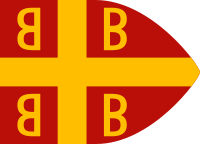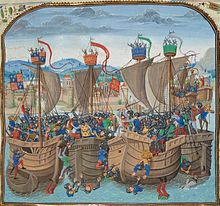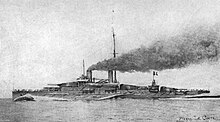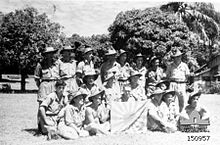Portal:History
The History Portal

Historia by Nikolaos Gyzis
History (derived from Ancient Greek ἱστορία (historía) 'inquiry; knowledge acquired by investigation') is the systematic study and documentation of the human past. History is an academic discipline which uses a narrative to describe, examine, question, and analyze past events, and investigate their patterns of cause and effect. Historians debate which narrative best explains an event, as well as the significance of different causes and effects. Historians debate the nature of history as an end in itself, and its usefulness in giving perspective on the problems of the present.
The period of events before the invention of writing systems is considered prehistory. "History" is an umbrella term comprising past events as well as the memory, discovery, collection, organization, presentation, and interpretation of these events. Historians seek knowledge of the past using historical sources such as written documents, oral accounts or traditional oral histories, art and material artifacts, and ecological markers.
Stories common to a particular culture, but not supported by external sources (such as the tales surrounding King Arthur), are usually classified as cultural heritage or legends. History differs from myth in that it is supported by verifiable evidence. However, ancient cultural influences have helped create variant interpretations of the nature of history, which have evolved over the centuries and continue to change today. The modern study of history is wide-ranging, and includes the study of specific regions and certain topical or thematic elements of historical investigation. History is taught as a part of primary and secondary education, and the academic study of history is a major discipline in universities.
Herodotus, a 5th-century BCE Greek historian, is often considered the "father of history", as one of the first historians in the Western tradition, though he has been criticized as the "father of lies". Along with his contemporary Thucydides, he helped form the foundations for the modern study of past events and societies. Their works continue to be read today, and the gap between the culture-focused Herodotus and the military-focused Thucydides remains a point of contention or approach in modern historical writing. In East Asia a state chronicle, the Spring and Autumn Annals, was reputed to date from as early as 722 BCE, though only 2nd-century BCE texts have survived. The title "father of history" has also been attributed, in their respective societies, to Sima Qian, Ibn Khaldun, and Kenneth Dike. (Full article...)
Featured picture
Did you know (auto generated)

- ... that Cyclone Freddy was the longest-lasting tropical cyclone recorded?
- ... that 104 miners were killed in the 1995 Vaal Reefs mining disaster when a locomotive fell on an elevator, making it history's deadliest elevator disaster?
- ... that Nakba denial is a form of historical negationism pertaining to the 1948 Palestinian expulsion and flight?
- ... that interviews collected for a Boston College oral history project were used in two murder trials?
- ... that Mess L, a multipurpose building in Banjarbaru, Indonesia, was historically used to house Soviet workers?
- ... that "Rich Men North of Richmond" by Oliver Anthony was the first single to debut at number one on the Billboard Hot 100 with no previous chart history for its artist?
Diocletian (/ˌdaɪ.əˈkliːʃən/ DYE-ə-KLEE-shən; Latin: Gaius Aurelius Valerius Diocletianus; Ancient Greek: Διοκλητιανός, romanized: Diokletianós; 242/245 – 311/312), nicknamed Jovius, was Roman emperor from 284 until his abdication in 305. He was born Diocles to a family of low status in the Roman province of Dalmatia. Diocles rose through the ranks of the military early in his career, eventually becoming a cavalry commander for the army of Emperor Carus. After the deaths of Carus and his son Numerian on a campaign in Persia, Diocles was proclaimed emperor by the troops, taking the name Diocletianus. The title was also claimed by Carus's surviving son, Carinus, but Diocletian defeated him in the Battle of the Margus.
Diocletian's reign stabilized the empire and ended the Crisis of the Third Century. He appointed fellow officer Maximian as Augustus, co-emperor, in 286. Diocletian reigned in the Eastern Empire, and Maximian reigned in the Western Empire. Diocletian delegated further on 1 March 293, appointing Galerius and Constantius as junior colleagues (each with the title Caesar), under himself and Maximian respectively. Under the Tetrarchy, or "rule of four", each tetrarch would rule over a quarter-division of the empire. Diocletian secured the empire's borders and purged it of all threats to his power. He defeated the Sarmatians and Carpi during several campaigns between 285 and 299, the Alamanni in 288, and usurpers in Egypt between 297 and 298. Galerius, aided by Diocletian, campaigned successfully against Persia, the empire's traditional enemy, and in 299, he sacked their capital, Ctesiphon. Diocletian led the subsequent negotiations and achieved a lasting and favorable peace. (Full article...)
On this day

- 1888 – Mary Jane Kelly, widely believed to be the fifth and final victim of the notorious unidentified serial killer Jack the Ripper, was murdered in London.
- 1914 – World War I: Off the Cocos (Keeling) Islands, the Australian light cruiser Sydney sank Emden, the last active German warship in the Indian Ocean, at the Battle of Cocos.
- 1939 – World War II: A covert Sicherheitsdienst operation captured two British agents of the Secret Intelligence Service near Venlo in the Netherlands.
- 1989 – East German official Günter Schabowski mistakenly announced the immediate opening of the inner German border, resulting in the fall of the Berlin Wall that night (border crossing pictured).
- 2019 – Pakistani prime minister Imran Khan inaugurated the Kartarpur Corridor, a visa-free border crossing connecting the Gurdwara Darbar Sahib to the India–Pakistan border.
- Domenico Lorenzo Ponziani (b. 1719)
- Lenore Romney (b. 1908)
- Harry Trott (d. 1917)
- Nadezhda Alliluyeva (d. 1932)
Selected quote
What is the use of living, if it be not to strive for noble causes and to make this muddled world a better place for those who will live in it after we are gone?
— Winston Churchill, British statesman
Related portals
More Did you know...
- ... that the underground Fortress of Mimoyecques (pictured) was built by Nazi Germany to bombard London with 10 shells a minute using the V-3 supergun?
- ... that Howard P. Perry was the first African American recruit in the United States Marine Corps?
- ... that the Chester city walls form the most complete circuit of Roman and medieval defensive town walls in Britain?
- ... that China's first female director was adopted by the first Premier of the People's Republic of China?
- ... that the Medieval Merchant's House in Southampton was being used as a brothel when bomb damage during the Blitz revealed the building's important medieval architecture?
- ... that the Sumerian "river of paradise", the Hubur, derived partly from real geography before becoming a demonic fantasy?
- ... that Bill Foley's photograph "The Last Smile" shows Anwar Sadat only moments before his assassination?
- ... that the 1911 Sarez earthquake triggered a huge landslide, forming the tallest dam in the world?
Topics
Categories

History • By period • By region • By topic • By ethnic group • Historiography • Archaeology • Books • Maps • Images • Magazines • Organizations • Fictional • Museums • Pseudohistory • Stubs • Timelines • Chronology • People • Wikipedia historians
WikiProjects
![]() WikiProject History •
Ancient Near East • Australian History • Classical Greece and Rome • Dacia • Former countries • History of Canada • Chinese history • European history • Heraldry and vexillology • Indian history • Jewish history • Medieval Scotland • Mesoamerica • Military history • Middle Ages • History of Science
WikiProject History •
Ancient Near East • Australian History • Classical Greece and Rome • Dacia • Former countries • History of Canada • Chinese history • European history • Heraldry and vexillology • Indian history • Jewish history • Medieval Scotland • Mesoamerica • Military history • Middle Ages • History of Science
WikiProject Time • Days of the Year • Years
WikiProject Biography • Composers • Political figures • Saints • United States Presidents
Things you can do
 |
Here are some tasks awaiting attention:
|
Associated Wikimedia
The following Wikimedia Foundation sister projects provide more on this subject:
-
Commons
Free media repository -
Wikibooks
Free textbooks and manuals -
Wikidata
Free knowledge base -
Wikinews
Free-content news -
Wikiquote
Collection of quotations -
Wikisource
Free-content library -
Wikiversity
Free learning tools -
Wiktionary
Dictionary and thesaurus





















































